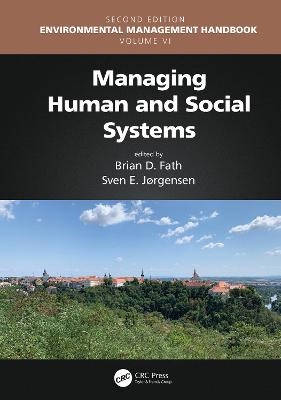
Managing Human and Social Systems
CRC Press (Verlag)
978-1-138-34268-2 (ISBN)
Bringing together a wealth of knowledge, Environmental Management Handbook, Second Edition, gives a comprehensive overview of environmental problems, their sources, their assessment, and their solutions. Through in-depth entries and a topical table of contents, readers will quickly find answers to questions about environmental problems and their corresponding management issues. This six-volume set is a reimagining of the award-winning Encyclopedia of Environmental Management, published in 2013, and features insights from more than 400 contributors, all experts in their field.
The experience, evidence, methods, and models used in studying environmental management are presented here in six stand-alone volumes, arranged along the major environmental systems.
Features
The first handbook that demonstrates the key processes and provisions for enhancing environmental management
Addresses new and cutting-edge topics on ecosystem services, resilience, sustainability, food–energy–water nexus, socio-ecological systems, and more
Provides an excellent basic knowledge on environmental systems, explains how these systems function, and offers strategies on how to best manage them
Includes the most important problems and solutions facing environmental management today
In this sixth volume, Managing Human and Social Systems, the reader is introduced to the general concepts and processes of all the environmental tools and their application to human and social systems. It explains how these systems function and provides strategies on how to best manage them. It serves as an excellent resource for finding basic knowledge on the human and social systems and includes important problems and solutions that environmental managers face today. This book practically demonstrates the key processes, methods, and models used in studying environmental management.
Brian D. Fath is a Professor in the Department of Biological Sciences at Towson University (Maryland, USA) and a Senior Research Scholar at the International Institute for Applied Systems Analysis (Laxenburg, Austria). He has published over 180 research papers, reports, and book chapters on environmental systems modeling, specifically in the areas of network analysis, urban metabolism, and sustainability. He has co-authored the books A New Ecology: Systems Perspective (2020), Foundations for Sustainability: A Coherent Framework of Life–Environment Relations (2019), and Flourishing within Limits to Growth: Following Nature’s Way (2015). He is also Editor-in-Chief for the journal Ecological Modelling and Co-Editor-in-Chief for Current Research in Environmental Sustainability. Dr. Fath was the 2016 recipient of the Prigogine Medal for outstanding work in systems ecology and twice a Fulbright Distinguished Chair (Parthenope University, Naples, Italy, in 2012 and Masaryk University, Czech Republic, in 2019). In addition, he has served as Secretary General of the International Society for Ecological Modelling, Co-Chair of the Ecosystem Dynamics Focus Research Group in the Community Surface Modeling Dynamics System, and member and past Chair of the Baltimore County Commission on Environmental Quality. Sven E. Jørgensen (1934–2016) was a Professor of Environmental Chemistry at Copenhagen University. He earned a doctorate of engineering in environmental technology and a doctorate of science in ecological modeling. He was an honorable doctor of science at Coimbra University (Portugal) and at Dar es Salaam (Tanzania). He was Editor-in-Chief of Ecological Modelling from the journal’s inception in 1975 until 2009. He was Editor-in-Chief for the Encyclopedia of Environmental Management (2013) and Encyclopedia of Ecology (2008). In 2004, Dr. Jorgensen was awarded the Stockholm Water Prize and the Prigogine Medal. He was awarded the Einstein Professorship by the Chinese Academy of Sciences in 2005. In 2007, he received the Pascal Medal and was elected a member of the European Academy of Sciences. He published over 350 papers and has edited or written over 70 books. Dr. Jorgensen gave popular and well-received lectures and courses in ecological modeling, ecosystem theory, and ecological engineering worldwide.
Section I: APC: Anthropogenic Chemicals and Activities 1. Food: Pesticide Contamination 2. Human Health: Consumer Concerns to Pesticides 3. Human Health: Endocrine Disruption 4. Human Health: Pesticides 5. Nanoparticles 6. Pharmaceuticals: Treatment Section II: COV: Comparative Overviews of Important Topics for Environmental Management 7. Buildings: Climate Change 8. Economic Growth: Slower by Design, Not Disaster 9. Food–Energy–Water Nexus 10. Geographic Information System (GIS): Land Use Planning 11. Industrial Networks 12. Land Restoration 13. Limits to Growth 14. Nuclear Energy: Economics 15. Remote Sensing and GIS Integration 16. Solid Waste: Municipal 17. Sustainability and Planning 18. Sustainable Development 19. Urban Agriculture Section III: CSS: Case Studies of Environmental Management 20. Cell Tower Procurement: Public School Placement 21. Community-Based Monitoring: Ngarenanyuki, Tanzania 22. Developing Countries: Pesticide Health Impacts 23. Insulation: Facilities Section IV: DIA: Diagnostic Tools: Monitoring, Ecological Modeling, Ecological Indicators, and Ecological Services 24. Environmental Accounting: A Tool for Supporting Environmental Management and Nature Conservation 25. Remote Sensing: Pollution 26. Solid Waste Management: Life Cycle Assessment 27. Sustainable Development: Ecological Footprint in Accounting 28. Environmental Legislation: Asia Section V: ELE: Focuses on the Use of Legislation or Policy to Address Environmental Problems 29. Environmental Policy 30. Environmental Policy: Innovations 31. Food Quality Protection Act 32. Food: Cosmetic Standards 33. Laws and Regulations: Food 34. Laws and Regulations: Pesticides 35. Laws and Regulations: Rotterdam Convention 36. Laws and Regulations: Soil 37. LEED-EB: Leadership in Energy and Environmental Design for Existing Buildings 38. LEED-NC: Leadership in Energy and Environmental Design for New Construction 39. Nanomaterials: Regulation and Risk Assessment Section VI: ENT: Environmental Management Using Environmental Technologies 40. Industrial Waste: Soil Pollution and Remediation 41. Pest Management: Crop Diversity 42. Pest Management: Intercropping 43. Precision Agriculture: Water and Nutrient Management Section VII: PRO: Basic Environmental Processes 44. Green Processes and Projects: Systems Analysis 45. Green Products: Production
| Erscheinungsdatum | 07.07.2020 |
|---|---|
| Reihe/Serie | Environmental Management Handbook, Second Edition, Six-Volume Set |
| Zusatzinfo | 65 Tables, black and white; 106 Illustrations, black and white |
| Verlagsort | London |
| Sprache | englisch |
| Maße | 178 x 254 mm |
| Gewicht | 1088 g |
| Themenwelt | Naturwissenschaften ► Biologie ► Botanik |
| Naturwissenschaften ► Biologie ► Ökologie / Naturschutz | |
| Technik ► Umwelttechnik / Biotechnologie | |
| ISBN-10 | 1-138-34268-8 / 1138342688 |
| ISBN-13 | 978-1-138-34268-2 / 9781138342682 |
| Zustand | Neuware |
| Informationen gemäß Produktsicherheitsverordnung (GPSR) | |
| Haben Sie eine Frage zum Produkt? |
aus dem Bereich


